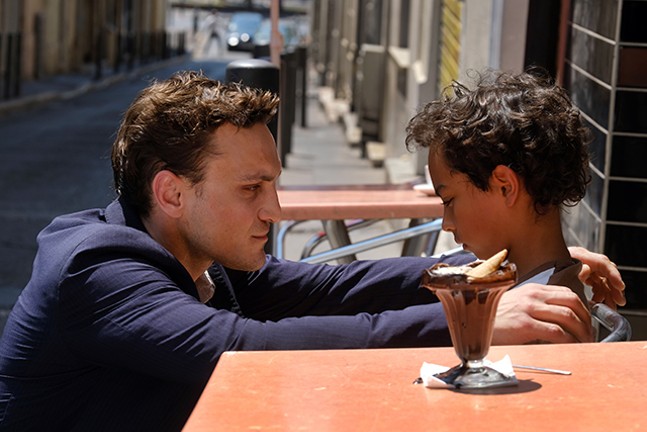Even when the world is falling apart, people still go shopping.
That’s an idea voiced early on in the 2018 German film Transit, when a character mentions George Romero’s 1978 movie Dawn of the Dead, noting how even as everything has descended into chaos and zombies roam the streets eating people's faces, everyone still ends up at a mall.
In Transit, too, as France is occupied by Germany, the residents still get coffee, still go out for pizza and wine, still go shopping. This isn't a 1940s Nazi occupation, but a surreal pseudo-modern version — the cars are contemporary, but nobody has cell phones or laptops. The police state here does things analog; paperwork, red tape, and old fashioned bureaucracy are in charge of those seeking asylum, as they might have during the Third Reich, but details about the occupancy and end game are blurry (despite mentions of juden, ghettos, and trains taking exiles ... elsewhere).
Things open at a bar in Paris where Georg (Franz Rogowski) is offered good money to deliver two letters to a famous writer named Weidel. Georg is a German-born TV and radio engineer and does his best to treat the dystopian circumstances with a steely, scientific regard, but anxiety and dread still leak from his face, shuddering as wailing police sirens fly down the tiny streets. He takes the gig, but when he finally gets to Weidel's hotel room, he finds the writer in a bloody bathtub with his wrists cut. Georg takes his travel documents and assumes Weidel's identity.
Transit initially seems like a dystopian The Talented Mr. Ripley — a handsome, smart protagonist insinuating himself into strangers' lives — but it soon veers into the territory of Children of Men and Schindler’s List, in which the need for identity theft for survival is not so much cunning as it is necessary. Georg isn't in Weidel's shoes for money or fame; he might as well have impersonated a well-liked butcher.
With Weidel's ID, Georg makes it to the yet-unoccupied Marseilles, where he encounters a cast of characters trying to plan for the horror that is surely arriving within the next few weeks. There's a North African kid named Driss (Lilien Batman) with whom Georg plays soccer, and his deaf-mute mother Melissa (Maryam Zaree); a fellow German who's watching two dogs she doesn't like for two Americans she doesn't know in order to get a sponsorship to immigrate to Washington, D.C.; and Weidel's widow Marie (Paula Beer). Marie is beautiful, mysterious, and sad — another 1940s throwback — and seems to know Georg's secret without ever coming out and saying it. With what's coming, what would it really matter?
At a certain point we’re told that leaving France was easier two weeks ago and would be harder once again two weeks from now. We’re on the edge of something terrible and it provokes a weird balance of wondering if the characters know the historical precedent of what’s coming or not. Maybe relevant: a character tells a joke about someone being sentenced to Hell in the afterlife and waiting at a nondescript door for information for weeks. When he finally finds someone in charge and asks where he can find Hell, he’s told that he’s already there.
If that’s the case, Hell is everywhere in Transit. The majority of scenes happen in quiet conversations in visibly hot rooms, in which people try to figure out where they are and where they’re going. There's something haunting about human suffering being decided at the whims of paper forms, initials and signatures, offices and desks and people in ties.
The absurdity and ease of evildoing run through every vein of Transit, and the effect is predictably complicated, unpleasant, dreary, but unexpectedly hopeful and humane. As several characters on the run say throughout the film, that might be the best anyone can hope for.
Transit. Directed by Christian Petzold. Opens Fri., May 31 at Harris Theater.














